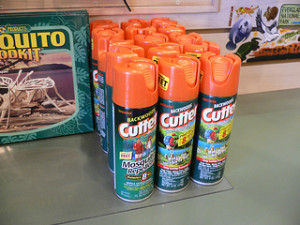What’s the Best Insect Repellent?
By Chris Williams on June 16, 2015.

People want to know. Moms, especially, want to know. What’s the best insect repellent? We want an insect repellent that lasts as long as possible and stops all (or almost all) bites from mosquitoes, ticks, chiggers, and biting flies.
DEET is Still the Winner
The Centers for Disease Control (CDC) has a quick answer to that often asked question, and the answer is to buy a product containing DEET. DEET (or N, N-diethyl-meta-toluamide) has been around for a long time. It was originally developed for the military in 1946 and its ability to repel mosquitoes hasn’t really been surpassed. There are about 230 DEET products available from many different manufacturers.
DEET works well against mosquitoes, no-see-ums (punkies or biting midges), black flies, ticks, chiggers, and even fleas. Like all of the other repellents, it does not work against the larger deer flies, greenheads, or horse flies. DEET products tend to have a greasy feel and can dissolve some plastics and paints.
The main thing to remember about DEET repellents is that the higher the percentage of DEET in the product, the more effective it is and the longer it lasts. DEET products can contain up to 100% DEET, but experts say you should limit the amount of DEET to no more than 30%. Check the Ingredients box on the front of the container for the percentage of DEET.
Non-DEET Repellents
Fortunately for those of you who can’t stand the smell or feel of DEET products, or are looking for something more “natural” or pesticide-free, some new repellent products have become available just in the last few years.
Picaridin – Picaridin may also be listed on containers as Bayrepel or KBR3023. It has proven to be highly effective against mosquitoes, biting midges (no-see-ums), and chiggers. Picaridin is not quite as effective as DEET against ticks so only products with higher concentrations of picaridin are also labeled to control ticks. Most of the producers of DEET repellents (Cutter, Avon, OFF, Repel, etc.) also have picaridin products.
IR3535 – This product has other names, including ethyl butyl acetyl aminoproprionate. It reportedly works moderately well against mosquitoes and fairly well against blacklegged ticks (the vector of Lyme disease). Some manufacturers have products that combine this repellent with a sunscreen (Avon Skin-So-Soft Bug Guard Plus).
Miscellaneous natural products – In general, repellents that are based on natural oils or herbs tend to be less effective than DEET or the products mentioned above. Most of these natural products provide a repellent effect similar to low levels of DEET and the repellency does not last as long.
Natural repellent products available may contain any of the following ingredients: oil of lemon eucalyptus (p-menthane 3,8-diol [PMD]), citronella (from Asian grasses), 2-Undecanone (from wild tomato plants), peppermint oil, or soybean oil.
For more on the safe and effective use of insect repellents, check out these blogs from Colonial Pest:
- Choosing and Using Insect Repellents
- Using Insect Repellents on Children
- Do Insect Repellents Work Against Ticks?
- Most of Us Don’t Buy or Use Insect Repellent
Photo credit: evergladesnps / Foter / CC BY